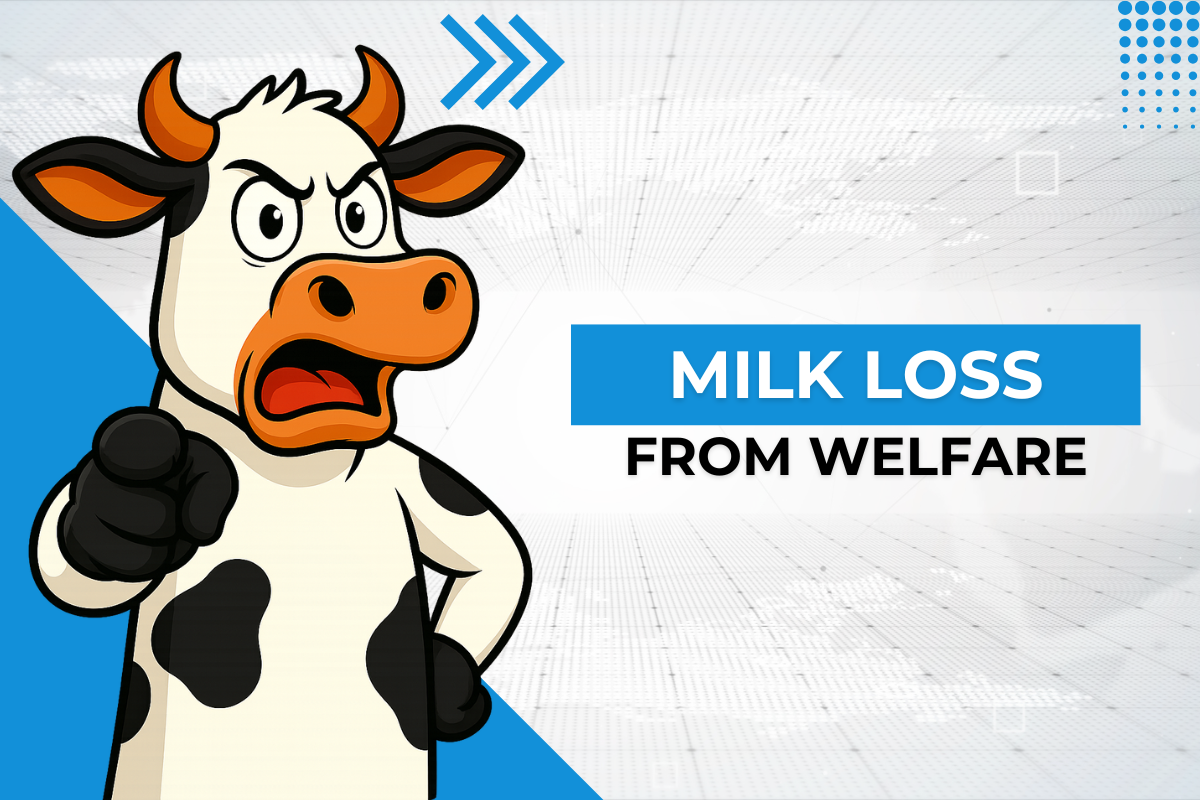Who is the biggest milk thief in your parlor?
Most dairy farms track feed costs and equipment problems, but they ignore the biggest milk thief: poor animal welfare.
Every time a cow gets stressed from rough handling or poor procedures, you lose milk. Research shows that mild stress cuts production by 2.5 pounds per cow per day. Moderate stress drops it by 6 pounds per cow per day.
At Cattle Care, we've watched thousands of hours of milking operations. We see how welfare problems steal milk production every single day. The worst part? Most farms don't even know it's happening.
Here's how poor welfare is quietly robbing your daily milk output.
Stress blocks milk flow
When cows get stressed, their bodies release cortisol. This hormone directly reduces milk production by messing with the systems that make milk.
Stressed cows also can't release oxytocin properly. This is the hormone that lets milk flow from the udder. Without proper oxytocin release, cows hold back milk even when they want to give it.
Signs your cows are holding back milk:
- Slow milk letdown at the start of milking
- Lower milk flow rates during milking
- Incomplete milking sessions
Research confirms that reactive cows during milking produce milk with higher cortisol levels. Higher stress equals less milk, every time.
Stressed cows eat less
Dairy cows under stress stop eating normally. They can reduce their feed intake by 20% to 40%.
Less feed means less energy for milk production. But it gets worse. Stress also makes cows digest feed poorly, so they get even less nutrition from what they do eat.
This creates a double hit on production:
- Less feed going in
- Poor use of the feed they do eat
Even if you're feeding the same rations, stressed cows produce less milk per pound of feed. You're paying full feed costs but getting reduced milk output.
Poor welfare creates bad habits
Cows remember bad experiences. When they get stressed during milking, they develop behaviors that protect them from future stress. These behaviors directly cut your milk production.
Common stress behaviors include:
- Milk withholding: Cows hold back milk to end milking sessions faster
- Restlessness: Extra movement burns energy that could go to milk production
- Avoidance: Cows resist entering the parlor or positioning for milking
Once cows develop these habits, they're hard to break. A single bad experience can affect milk production for weeks.
The daily math adds up fast
Let's look at real numbers. Say you milk 1,000 cows and poor welfare affects just 25% of your herd. If those 250 cows each lose 3 pounds of milk per day from stress, you're losing 750 pounds of milk daily.
Over a year, that's 273,750 pounds of lost milk. At current milk prices, that's serious money walking out your door.
But the real cost is higher because you still pay the same for:
- Feed for those 250 cows
- Labor to milk them
- Facility costs to house them
Your cost per pound of milk goes up when production goes down.
Heat stress makes it worse
Many farms already deal with heat stress, which cuts milk production. Adding welfare stress on top of heat stress creates bigger losses.
Farms dealing with both heat and welfare stress see the biggest production drops. The effects add up, not cancel out.
Quality problems cost more
Stressed cows don't just produce less milk, they produce lower quality milk. Stress increases somatic cell counts, which can affect your milk price and processor relationships.
Higher somatic cell counts mean:
- Price penalties from processors
- Increased mastitis risk
- More veterinary costs
Poor welfare creates a cycle where you get less milk and lower prices for the milk you do get.
The solution is monitoring
The biggest problem with welfare penalties is that they're invisible. You can't fix what you can't see.
That's exactly why we built OmniCow. Our system uses AI to watch for welfare problems in real-time. It spots stress behaviors, rough handling, and procedure problems before they cost you milk.
OmniCow identifies:
- Cows showing stress behaviors
- Workers using rough handling
- Missing welfare procedures
- Patterns that hurt production
With real-time monitoring, you can fix welfare problems immediately instead of losing milk day after day.
What this means for your farm
Poor animal welfare isn't just an ethical issue, it's a production issue that costs you money every single day.
The good news? Most welfare problems are fixable once you know they exist. Better handling, consistent procedures, and proper monitoring can restore lost production quickly.
When cows feel comfortable and safe, they produce more milk. It's that simple.
OmniCow gives you the eyes you need to spot welfare problems before they steal your milk. Because the best way to protect your production is to protect your cows.
👉 Ready to stop losing milk to welfare problems? Book a call here to see how OmniCow will help you protect your daily milk production.




